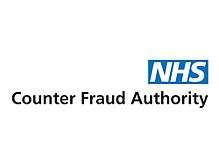NHS Counter Fraud Authority
The NHS Counter Fraud Authority is a special health authority charged with identifying, investigating and preventing fraud and other economic crime within the NHS and the wider health group, formed on November 1, 2017 under section 28 of the National Health Service Act 2006.[1] It replaces its predecessor NHS Protect, which was part of the NHS Business Services Authority.
 NHS Fraud. See it. Report it. Together we stop it. | |
| Agency overview | |
|---|---|
| Formed | 1 November 2017 |
| Preceding agency | |
| Jurisdiction | England |
| Headquarters | Skipton House, Elephant and Castle, London |
| Motto | NHS Fraud. See it. Report it. Together we stop it. |
| Employees | 156 |
| Agency executives |
|
| Parent department | Department of Health and Social Care |
| Key document | |
| Website | cfa |
Role
As a special health authority focused entirely on counter-fraud work, the Counter Fraud Authority is independent from other NHS bodies and as an arm's length body is directly accountable to the Department of Health and Social Care.
The departmental sponsor is the Department of Health and Social Care's Anti-Fraud Unit, which holds the board to account for the delivery of its strategy.[2]
The mission of the organisation is to lead the fight against fraud affecting the NHS and wider health service, and protect vital resources intended for patient care. It is intended to be the single expert, intelligence-led organisation providing centralised intelligence, investigation and solutions capacity for tackling fraud in the NHS in England. It acts as the repository for all information related to fraud in the NHS and the wider health group, and will have oversight of and monitor counter fraud work across the NHS.[2]
It calculates that £216 million in fraud was “almost certain” and a further £135 million was “highly likely” with around £560 million considered likely. This included £100 million of pharmaceutical contract fraud, £90.6 million payroll and identity fraud and £165 million related to procurement and commissioning.[3]
Objectives
It had five objectives for 2017–2020:
- Deliver the Department of Health's strategy, vision and strategic plan and lead counter fraud activity in the NHS in England.
- Be the single expert intelligence-led organisation providing a centralised investigation capacity for complex economic crime matters in the NHS.
- Lead and influence the improvement of standards in counter fraud work across the NHS.
- Take the lead in and encourage fraud reporting across the NHS and wider health group.
- Continue to develop the expertise of staff.[4]
It aims to identify current and future fraud risks and adapt to emerging threats and issues, meeting head-on the fraud risks affecting the NHS and wider health group.[2]
Location
The organisation's headquarters is at Skipton House, London,[5] with additional offices at Citygate in Newcastle upon Tyne and Cheylesmore House in Coventry.[6]
References
- "The NHS Counter Fraud Authority (Investigatory Powers and Other Miscellaneous Amendments) Order 2017". www.legislation.gov.uk. Retrieved 2017-12-18.
- "Leading the fight against NHS fraud" (PDF). NHS Counter Fraud Authority.
- "New quango warns £560m NHS fraud going undetected". Health Service Journal. 1 November 2017. Retrieved 24 December 2017.
- "The work of the NHS Counter Fraud Authority". Retrieved 2017-12-19.
- "Department of Health's agencies and partner organisations - GOV.UK". Retrieved 2017-12-18.
- "NHSCFA Corporate publications". Retrieved 2017-12-18.